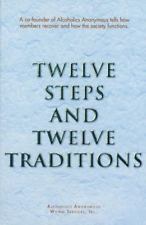
"Alcoholics Anonymous has no opinion on outside issues; hence the A.A. name ought never be drawn into public controversy."

 |
Tradition Ten "Alcoholics Anonymous has no opinion on outside issues; hence the A.A. name ought never be drawn into public controversy." |
 |
"NEVER since it began has Alcoholics Anonymous been divided by a major controversial issue. Nor has our Fellowship ever publicly taken sides on any question in an embattled world." With this bold and categorical statement, the author begins a discussion of Tradition Ten. Arguments among A.A. members on religious, political and reform issues are said to be rare, ensuring that the fellowship as a whole will not engage in them. A.A.'s seem to instinctively know that publicly taking sides in any controversy is to be avoided. Controversy, self-righteousness and attempting to enforce ideals on others has led to groups and nations come apart. War and mass death have followed from racial, political and religious differences.
A.A. members are free to act and speak as individuals as they see fit regarding various issues, but not the Society as a whole. "We conceive the survival and spread of Alcoholics Anonymous to be something of far greater importance than the weight we could collectively throw back of any other cause. Since recovery from alcoholism is life itself to us, it is imperative that we preserve in full strength our means of survival." (Page 177) Disputes within the fellowship over expenses, leadership and the like are not uncommon, but they have proven harmless. They have generally been concerned with making A.A. more effective - in carrying the message, that is, an implicit reference to the Primary Purpose and Tradition Five.
Ironically, since the fellowship has never experienced divisions over contentious issues, the author must cite the example of another group to show the damaging effects of engaging in public controversy. If not for the direct relevance to the fellowship's survival, this would be considered an 'outside issue'. The Washingtonian Society is said to have "almost discovered the answer to alcoholism" (Page 178) and had over 100,000 members - a number comparable to A.A.'s membership at the time of the Twelve and Twelve. The Washingtonians might have discovered the rest of the answer to our common problem if they had stuck to their one goal (that is, their Primary Purpose). "Instead, the Washingtonians permitted politicians and reformers, both alcoholic and nonalcoholic, to use the society for their own purposes." (Page 178) The Society might have survived their involvement in Abolition, the biggest political issue of their day. But they were doomed when it tried to reform America's drinking habits. Temperance was not only a major political issue in the Nineteenth Century: It is important to remember that Prohibition was a very recent memory at the time of A.A.'s founding. "When the Washingtonians became temperance crusaders, within a very few years they had completely lost their effectiveness in helping alcoholics." (Page 178) In fact, there is an explicit warning in Working With Others not to show intolerance or hatred of drinking: "A spirit of intolerance might repel alcoholics whose lives could have been saved, had it not been for such stupidity.' (Big Book, Page 103). The author concludes: "Thus was laid the cornerstone for Tradition Ten: 'Alcoholics Anonymous has no opinion on outside issues; hence the A.A. name ought never be drawn into public controversy.'" (Page 179)